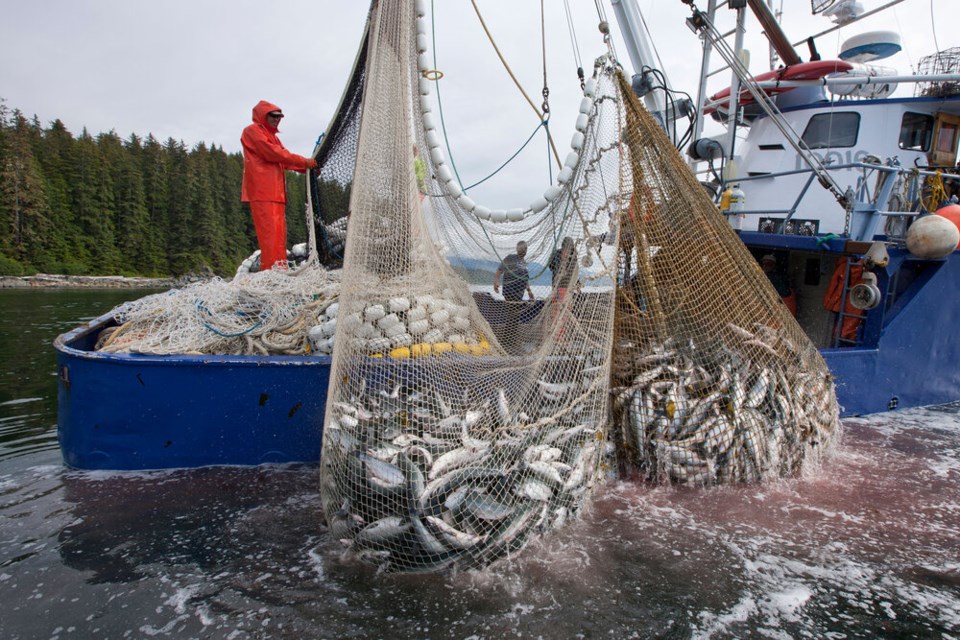An independent adjudicator has accepted a complaint from three B.C. groups that last week called on the Marine Stewardship Council (MSC) to suspend Alaskan salmon as “sustainable.”
The official challenge to the MSC, the world’s premier seafood certification body, came after SkeenaWild Conservation Trust and Raincoast Conservation Foundation accused Alaskan salmon fishers of intercepting millions of fish bound for home rivers in B.C., Washington and Oregon.
In a letter to the B.C. groups, independent adjudicator Melanie Carter's decision to proceed with the complaint cites a dispute process requiring challengers have a “reasonable prospect of success” that is “neither spurious or vexatious.”
Misty MacDuffee, Raincoast’s wild salmon program director, said in a statement that in accepting the objection, the adjudicator acknowledged “there may be flaws in the assessment of Alaska’s salmon fishery.”
Together with Watershed Watch Salmon Society, whose name was not on the documents but is supporting the complaint, the groups also allege the Alaskan fishery has not met past MSC conditions for certification, relies on incomplete data under the Pacific Salmon Treaty, and mischaracterizes certain fish stocks.
One of the central complaints alleges the state is mischaracterizing basic facts about how purse seine fishery off Alaska’s Panhandle operates. Purse seine boats fish by casting out a large net that is later drawn closed and cinched up like a drawstring bag.
In B.C., fisherman are required to hang the bag off the side of their boats and scoop the fish out so non-target species — or bycatch — can escape back into the sea, says executive director of Watershed Watch Aaron Hill. But in Alaska, Hill says that’s not happening. Instead, he says they dump the contents of the net onto the deck of the boat.
“They just kick, push fish into the hold,” he said. “There’s no requirement to get the fish back into the water alive and certainly nobody watching them to make sure they do that.”
“We think there’s a 100 per cent mortality on the bycatch.”
Many of those fish are chinook salmon, the primary food source of the southern resident killer whale and the subject a 2023 U.S. court decision in which an expert declaration said intercepted chinook represent five per cent of available prey, enough fish to stabilize the threatened whale population.
U.S. District Judge Richard Jones’s May 2023 ruling vacated permits that allowed fisheries in southeast Alaska to intercept hundreds of thousands of chinook salmon. The judge found the U.S. federal government’s plans to protect salmon from fishing were too vague and contributed to starving the southern resident killer whale population, violating laws protecting the endangered species.
Doug Vincent-Lang, commissioner for Alaska’s Department of Fish and Game, said the state has appealed that ruling in a case that is set to be heard over the coming months. Meanwhile, fisheries in southeast Alaska have been allowed to continue operations. Vincent-Lang said any challenges to the sustainability of Alaska’s salmon fishery should be heard through the bilateral Pacific Salmon Treaty.
“We are convinced that our fisheries are sustainably managed,” the commissioner told Glacier Media last week.
For his part, Hill said he hopes the process results in “the end of MSC greenwashing this fishery.” ‘Greenwashing’ includes false, misleading or unsubstantiated environmental claims used to create an impression that a product or service is ‘greener’ than it really is, according to Canada’s Competition Bureau.
“We hope people in the seafood industry buying Alaska salmon and believing they are sustainable are paying attention,” Hill said.
As the process moves forward, both Alaska and the B.C. groups challenging the state’s sustainable certifications will have an opportunity to present evidence and argue their case to the MSC.
Jackie Marks, a spokesperson for MSC, said the parties involved now have 15 days to consult with each other to reach agreement on one or more items raised in the challenge.
“The MSC is not involved in this process; an independent adjudicator is in charge,” Marks said in an email.



